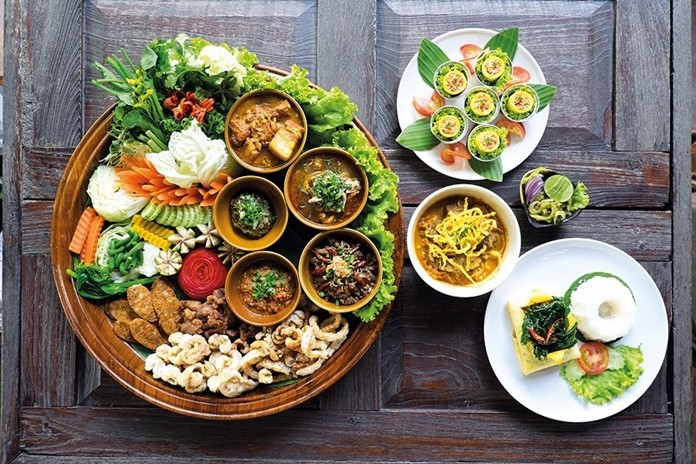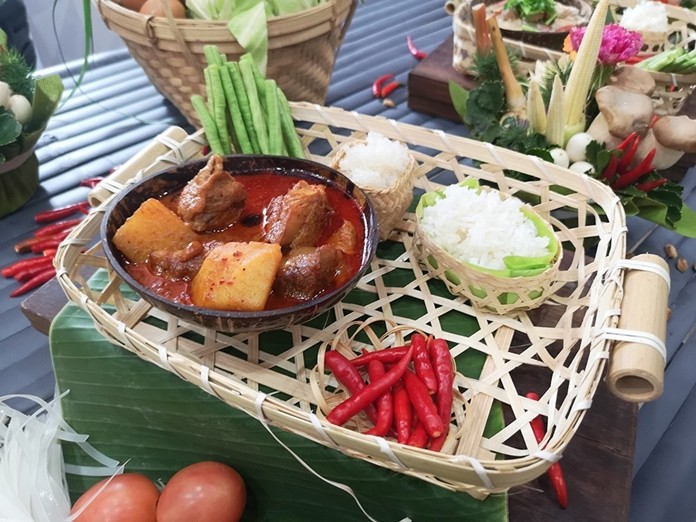
Thai food is known for its scintillating flavors, astounding variety and aesthetic appeal. Here are some ‘must-eat’ dishes from different regions of the kingdom.
The North
Continuing a dining tradition of old Chiang Mai and the Lanna Kingdom, a khan toke dinner features a small round table upon which is served a variety of dishes in individual bowls. People sit on mats or cushions around the table and choose from the dishes as they like. The dishes typically include such delights as sticky rice, chicken or pork curry, fried chicken, vegetables, soup, fried pork skin and chili dips. During the dinner, there are traditional dance, music and sword performances to entertain diners.

A delicious dish that’s iconic of Chiang Mai, khaosoi is a creamy yellow curry soup with egg noodles and slow-cooked chicken (sometimes beef) that’s tender enough to slide right off the bone. It’s topped off with crunchy fried noodles for a lovely contrast to the egg noodles. The tasty soup is typically made with coconut milk, and sides like lime, shallots and pickled vegetables offer even more scintillating flavors.
The Northeast (I-san)
Lap is a spicy salad dish from the Northeast and neighboring Lao PDR., but it’s not a vegetable salad … it’s a meat salad. Often eaten with sticky rice, two of the most popular variations are lap kai (chicken) and lap mu (pork), in which the meat is minced and tossed with fish sauce, lime juice, chili flakes, mint, basil and red onions, as well as toasted rice for a touch of crunchiness. Lap wunsen is another variation that uses glass noodles or vermicelli.

Spot a food vendor vigorously mushing away with a mortar and pestle, and there’s a good chance they’re making som tam. This spicy green papaya salad is a Northeastern dish widely consumed throughout Thailand, often together with sticky rice and grilled chicken. Som tam is made to a customer’s particular liking and the usual ingredients include sliced tomatoes, yard long beans, peanuts, dried shrimp, garlic, fish sauce, lime, palm sugar and sometimes freshwater rice paddy crabs.
Literally translating to ‘sausage from the Northeast’, saikrok Isan is a garlicky fermented sausage made of pork and rice. The rice helps the fermentation process that gives the sausage its signature tanginess. Sai krok Isan can be eaten on its own or with sticky rice, and also fresh cabbage leaves and ginger to counteract the garlic element.
Nam tok in Thai means waterfall, and namtoknuea is a juicy, tangy beef salad typically eaten with sticky rice and so named for the juices dripping from the meat, as it is grilled. Shallots, onions, lime juice, mint leaves and ground roasted rice are added to the beef which is sliced into bite-size pieces.
Central Thailand
Usually eaten with rice, massaman is a rich, relatively mild curry in which spices not frequently used in Thai curries; such as, cinnamon, nutmeg, mace, cardamom, cloves, cumin, bay leaves and star anise are combined with local produce like dried chili peppers, cilantro seeds, lemongrass, galangal, white pepper, shallots and garlic. Due to its Muslim roots, massaman is most commonly made with chicken, although there are beef, mutton and duck variations. Potatoes and onions are added in, as well as coconut milk and peanuts.

Kaengkhiao wan is a green curry dish also eaten with rice. Coconut milk and fresh green chilies give this curry its creamy green color, and it tends to be more pungent than the milder red curries. Along with fish, fish balls or meat, other ingredients include fish sauce, Thai eggplant, pea aubergine and vegetables.
Kaengsom or Thai sour curry is a spicy fish curry or soup with vegetables, one that is made without coconut milk and which gets its characteristic sour taste from the tamarind used in its preparation. The favoured vegetable ingredients include cauliflower, white radish, cabbage, carrot, long beans, Chinese cabbage and asparagus. A popular alternative to fish for this dish that’s eaten with rice too, are shrimps.
With their unique spongey texture, Thai fish cakes or thot man pla hold sauces and other liquids well and so when they’re bitten into, all those flavors are released. The fish cakes’ own distinctive taste comes from the red curry paste, kaffir lime leaves, shrimp paste and chili ingredients used to make them.
The South
Few dishes say ‘Southern Thai cuisine’ more than khao yam paktai, a tart and salty rice salad that contains an array of ingredients including carrots and long beans, sour mango, pomelo, ground dried shrimp or fish, roasted coconut, kaffir lime leaves, lemongrass and chilies. A main component of this dish is a distinctive salad dressing called nambudu made from fish or prawns fermented with salt. The rice eaten with khao yam paktai is typically cooked with Morinda leaves or butterfly pea flower juice, for color and aroma.
While to some it is an acquired taste, in the South of Thailand phat sato is a popular snack. Also known as stink beans due to their powerful aroma, these nutrition-packed beans are commonly stir-fried in a curry paste blended from other robust ingredients like garlic and chilies, and accompanied by pork or shrimps.
Pla thot kamin or turmeric fried fish is another popular Southern Thai dish. The fish most commonly used is pladaeng, a type of threadfin bream, and this is cooked to slightly crispy. The use of garlic and turmeric – known for its many medicinal and health properties – enhances the dish’s flavors.
The East
Thai massaman has been ranked among the world’s best food dishes by CNN, and a delicious variation from Eastern Thailand is Thai massaman durian curry with chicken. It’s a delightful fusion of the great flavors of the massaman curry and the so-called ‘king of fruits’, and it makes sense given that the Eastern province of Chanthaburi is famed for its fruit production, especially durian.
Chamuang leaves are a popular ingredient in Eastern Thai cooking and notable dishes that feature their tart, sour taste sensation include kaeng mu baichamuang or pork belly curry with sour Chamuang leaves and tom baiChamuang, which is similar to the world-famous tom yam soup.
Ban Bueng pork noodle soup is a well-loved clear soup dish associated with Chon Buri’s Ban Bueng district, which features dried squid and fried Chinese fish balls.




